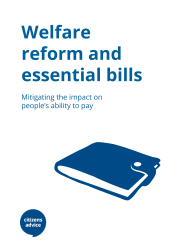Welfare reform and essential bills: mitigating the impact on people’s ability to pay
 Welfare reform and essential bills: Mitigating the impact on people's ability to pay.
Welfare reform and essential bills: Mitigating the impact on people's ability to pay.
As a result of welfare changes, many households in receipt of means-tested benefits have seen their income fall in recent years. Our 2014 report, All Change set out to help creditors understand the scale and impact of welfare reforms, and provided some practical advice as to how they could support customers facing financial difficulty through these changes.
The welfare reforms previewed in All Change have now been implemented, further changes (for example, around housing benefit) have also been introduced, and still further changes will take place over the next couple of years. Moving the current tax credits population over to Universal Credit is itself a huge reform, affecting six million households (1), so the changes to come will affect a large and diverse portion of the population. The scale and significance of these welfare changes raises important questions about how utilities providers are responding and supporting their more vulnerable customers manage their essential household bills.
With the changing welfare landscape, and in the wider context of wages not having kept pace with inflation and the persistence of insecure work (2), it is timely to take stock of the impact of welfare reforms and to examine the progress that utilities providers have made in terms of their debt prevention and collection practices. All households have to manage a series of essential household bills: housing, energy, telecoms, water and council tax. This report places particular focus on the energy and telecoms markets, as there is less evidence to date on the implications of welfare reforms on debt in these areas. However there is scope for firms in other industries to learn from the developments here. By sharing and disseminating examples of best practice, this report seeks to encourage and enable other providers who have been less engaged in these issues so far to develop debt collection and prevention strategies that are flexible and sensitive to the financial pressures that households in financial difficulty are facing.
In order to explore these issues we commissioned the New Policy Institute (NPI) to conduct fresh analysis of large, national datasets such as the Family Resources Survey. Alongside this we conducted qualitative research among utilities providers and consumers in receipt of means-tested benefits.
(1) Institute for Fiscal Studies
(2) Citizens Advice, The importance of income security, 2016.

